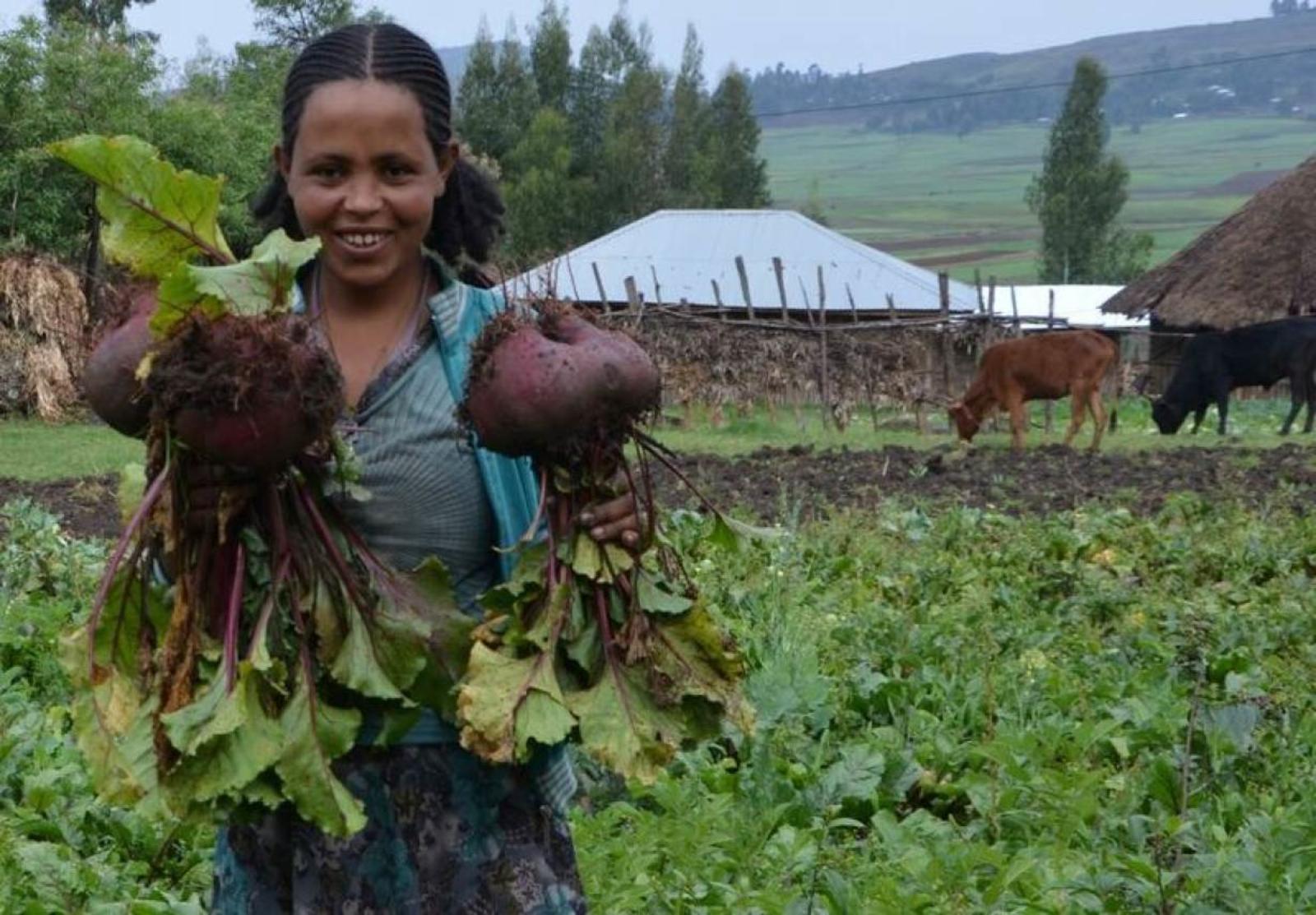June 27, 2018
Empowering women in Ethiopia’s rural communitiesIla Robale collects livestock feed for her ox. SDG Fund/UN Women/Fikerte Abebe
by Paloma Durán
Rural women play a vital role in Ethiopia’s agricultural sector, but often have limited access to training, finance, and information
Ila Robale, a widowed mother of five in Ethiopia, used to plough her land by renting an ox. But after getting a loan, she purchased her own pair of oxen, which helped increase her production of maize. The additional income covered schooling costs for two of her daughters.
“I keep four quintals for the family’s consumption and will sell the rest when the price gets higher,” she said.
Robale is one of more than 2,000 women farmers and agro-pastoralists in rural Ethiopia who participated in a program by the Sustainable Development Goals Fund (SDG Fund). The groundbreaking initiative, which focused on economic empowerment of rural women, helped improve their and their families’ food security and nutrition, boosted participants’ income, improved their leadership skills, and fostered better gender relations in their communities.
The Ethiopia program exemplifies how initiatives targeting women can not only improve their lives, but those of their children and families, and entire communities. By incorporating a gender-sensitive approach – as we do with all of our programs – we are not only harnessing the power of women, but helping unleash the economic potential of entire villages, regions and countries. In places like Ethiopia, where so many families depend on agriculture for their livelihood, this approach is critical for families to survive and communities to flourish.
Rural women play a vital role in Ethiopia’s agricultural sector, but often have limited access to training, finance, and information. SDG Fund’s program provided training on topics ranging from small-scale irrigation practices to healthy nutrition. More than 760 women received better grain, vegetable and apple seeds, and 500 women benefited from supplies such as maize shellers, water pumps and tractors.
WHAT A SMALL LOAN CAN DO
The $3 million program also established a fund that enabled more than 1,700 women to access startup capital.
Safaya Kabato said getting a $310 loan in 2016 allowed her to purchase a pregnant milking cow and livestock feed. When the cow gave birth, she got 4 liters per milk a day. She sold some of it to two village households used the rest for her family.
“Before, I never saved income from the sale of milk,” she said. “Now, I have opened a bank [account] and saved [$55], which I will not use for any other purposes rather than expanding the milk business.”

A woman harvest vegetables SDG Fund/UN Women/Fikerte Abebe
About 900 women were able to diversify their income sources thanks to the program, and 600 women opened bank accounts. Program participants were also given support on issues such as business and entrepreneurial skills, helping boost their incomes and improve their livelihoods.
Change, for women and men, starts from the household
But the work did not stop there. In many of these rural communities, women are not represented in key economic and social groups, so they lack decision-making power, which greatly limits their potential as well as that of the country’s agricultural sector. A number of targeted efforts took place to tackle this challenge, including the establishment of the Ethiopian Network for Gender Equality in Agriculture. The program also ran workshops on gender-sensitivity issues.
The husband of one of the program beneficiaries said such training helped him see some of the inequalities in their marriage and household.
“I was brought up knowing the housework belong[s] to the women and girls,” Messay Tibebu Markos said. “After my wife and myself attended the awareness creation sessions on gender relations and roles, my attitude has changed. Now, for example, when she bakes the traditional bread, injera, I cook the stew, wat… Change starts from our household, where my wife and myself will make sure to bring up our boys and girls equally so that they will contribute to make the future community even better.”
SDG Fund’s program in Ethiopia made a difference in the lives of more than 14,000 family members, and indirectly benefited 32,000 community members. We hope the program is replicated in other places, so that gender-responsive policies become the norm everywhere. Agricultural practices that fully include women are not only the right thing to do, but are economically prudent. Communities that fully support women farmers will be able to unlock their potential faster, and the benefits will be realized from household to household.
Paloma Durán is the director of the Sustainable Development Goals Fund (SDG Fund).






